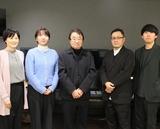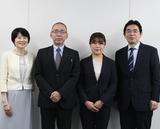September 2013
Striving to Become the No.1 Business School in Asia: Graduate School of Management, GLOBIS University
Creative English Translation Greatly Affects the Quality of our Program
Ohsato: I believe that controlling the quality of the English program is of the utmost priority in order to ensure that students from around the world will continue coming to your program. How are you dealing with this?
Nakamura: GLOBIS is characterized by the "high level of student satisfaction," "having only lecturers who have business experience," its "creation and innovation," and "high aspirations." Firstly, the satisfaction level of students is very high. We're the only school that guarantees a refund for students who did not find the program satisfactory. That's how much we care about the quality of our programs. Secondly, we have student evaluate the lecturers. We don't employ someone to serve as a lecturer unless he or she has adequate business experience and is passionate about teaching. Thirdly, "creation and innovation" refers to starting a business from scratch or transforming a major corporation. Lastly, our aspiration is to help every single student find their objective in life.
Sato: Considering that you strongly emphasize the advantages of studying in Japan, it must also be important to convey the uniqueness and specialty of your program. In that sense, I think the quality of your teaching materials must be called into question, too. What are you especially careful about when creating your English teaching materials?
Taoka: We make sure to focus on the case studies of Japan companies. We bring forth advantages that are unique to a Japanese school, for instance by covering the cases of difficulties experienced by Japanese companies when trying to expand their businesses abroad. That's exactly what we think the appeal of learning in Japan is. Part of this lies in the ways of thinking that are specific to Japan or Asia, and the quality of the English is crucial in order to get these ideas across to international students and we devote a lot of attention to this. When we were providing Japanese students with English programs, it was all right so long as the grammar was correct because they already understood the culture. However, in order to provide a high-quality program for people from different countries, more natural and persuasive English was required. In other words, logical and creative English became essential. Arc Communications has helped us with these translations. We're very grateful.

Ohsato: Indeed. We used to help with translations into Japanese. Now we're assisting you with translations into English as well. We're honored to be able to help.
Conveying the Significance of Studying in Japan to Both Japanese and International Students
Sato: You mentioned the enthusiasm of young people in Asia toward studying in Japan. It was a reflection of the energy present in developing nations. Meanwhile, what are GLOBIS' thoughts regarding the global education of Japanese youths? I think your mission going forward is also to nurture Japanese global leaders.
Nakamura: The education of Japanese youths is indeed a major challenge. At GLOBIS, we adopted a system in which students who take the Japanese-language MBA program can also choose to take up to one third of their classes in English so long as they pass an English proficiency screening.
Taoka: I think that in order to succeed on a global level, logical thinking abilities are required in addition to language skills. When I talk to people from various foreign countries, I find that the order in which they present matters or the way they appeal things differ from person to person. The "Critical Thinking" program is popular at GLOBIS, and, in my opinion, this is precisely the skill required for being able to comprehend matters in a global society.
Nakamura: At GLOBIS, we consider the following six skills to be requirements for global leadership: "business skills," "conceptual skills," "human skills," "English skills," "global perspective" and "cultural adaptation skills." The first three are the abilities a leader needs on a domestic as well as global scale. The latter three are abilities that are required if you intend to play an important role on a global level.
Sato: I believe studying in the U.S. is very beneficial for Japanese students, but I would also like to recommend them to take the time to consider your full-time English MBA program. This program should be especially appealing to highly motivated people who want to study again after having entered the workforce.
Nakamura: You're absolutely right. Both Mr. Hori and I studied at Harvard while Ms. Ohsato, you studied at the Kellogg School of Management. Both are wonderful schools. However, times have changed. Considering family situations, the environment the MBA student will find him/herself in after graduation, the time required and so on, I think that the advantages of acquiring an MBA degree in Japan ought to be appreciated more. In the future, we hope to see Japanese students accounting for 20-30% of the students in the English program.
Ohsato: As you said, I did my MBA at the Kellogg School of Management. While in school, I worried from time to time as to whether my studies would be of use in Japan since I learned exclusively about business in America. In fact, after graduating, as I worked in Japan and China, I sometimes felt that I could not easily apply in my work what I had learned in the stateside MBA program. I think that whether it is someone from Japan or another Asian country, it is extremely beneficial for them to be able to study in Japan, which is close to the environment they will work in after graduation. I look forward to seeing GLOBIS appeal this point even further and serving an even greater role.
Nakamura: I'm currently studying Yangmingism [note: a philosophical school of Neo-Confucianism] with foreign students. It has been very challenging yet fun to translate the concepts into English! (Laughs) Students are finding it exciting to debate in a mix of Chinese, Japanese and English.
Taoka: Out of the four characteristics we mentioned earlier, "aspiration" as we define it is an Oriental concept. Students seem to find it very new and refreshing. I hope to also spread the joys of learning the spirit of Japan that goes beyond the business framework, such as "having a goal that you want to eventually achieve" and "thinking about what kind of person you want to become."
Ohsato: I found listening to you both talk with such enthusiasm about applying good Japanese-style management methods on a global scale and hearing your know-how on the cultivation of global human resources to be very inspiring. I have great expectations for the education of global leaders for the Asian stage. Thank you very much for your time and wonderful conversation.
Feature Interview Index
















